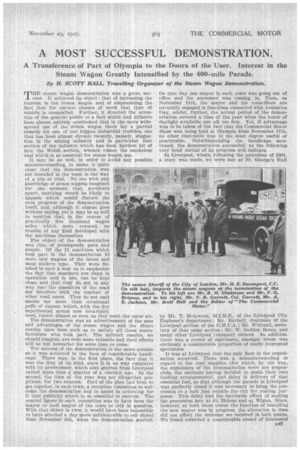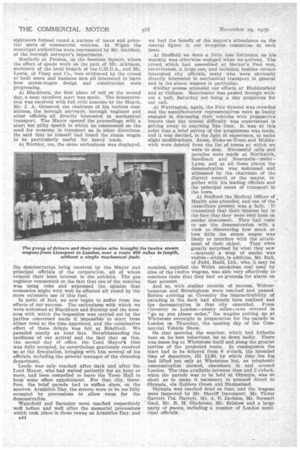A MOST SUCCESSFUL DEMONSTRATION.
Page 69

Page 70

If you've noticed an error in this article please click here to report it so we can fix it.
A Transference of Part of Olympia to the Doors of the User. Interest in the Steam Wagon Greatly Intensified by the 400-mile Parade.
By H. SCOTT HALL, Travelling Organizer of the Steam Wagon Demonstration.
T"steam wagon demonstration was a great success. It achieved its object : that of increasing the interest in the steam wagon and of emphasizing the fact Oat for certain classes of work that type of vehicle is unequalled. Further, it directed the attention of the general public to a fact which had hitherto been almost entirely overlooked that in the more widespread use of the steam wagon there lay a partial remedy for one of our biggest industrial troubles, one that has been almost chronic recently, namely, stagnation in the mining industry and in particular that section of the industry which has been hardest hit of late, the Welsh section, whence comes the smokeless coal which is so essential for steam wagon use.
It may be as well, in order to avoid any possible misunderstanding, to make it quite clear that the demonstration was not intended in the least in the way of a test or trial. No one with any knowledge of steam wagons imagined for one moment that, accidents apart, anything would be likely to happen which would disturb the even progress of the demonstration itself, and, although it almost goes. without saying, yet it may be as well to mention that, in the course of practically five thousand wagon miles which were covered, no trouble of any kind developed with the machines themselves.
The object of the demonstration was that of propaganda pure and simple, Of the 12 machines which took part in the demonstration IQ were new wagons of the latest and most modern type. They were finished in such a way as to emphasize the fact that steamers are clean in operation and in use, can be kept clean and that they do not. in any way mar the amenities of the road nor interfere with the comfort of other road users: They do not emit smoke nor more than occasional puffs of vapour, which, with the dry superheated steam now invariably used, vanish almost so soon as they meet the outer air.
The demonstration was an advertisement of the uses and advantages of the steam wagon and the direct results have been such as to satisfy all those manufacturers who took part. The indirect results, we should imagine, are even more valuable and their effects will be felt hereafter for some time to come.
The success of the demonstration is the more notable as it was achieved in the face of considerable handicaps. There was, in the first place, the fact that it was the first of its kind, since it in no way compares with its predecessor, which also started from Liverpool rather more than a quarter of a century ago. In the second, the time of the year was not altogether propitious, for two reasons. Part of the plan had been to get together, in each town, a reception committee to welcome the demonstration and to assist in achieving for it that publicity which is so essential to success. The central figure in each committee was to have been the mayor or lord mayor of the town or city in question. With that object in view, it would have been impossible to have selected a day more unfa.Vourahle to our object than November 9th, when the demonstration started. On that day one mayor in each town was going out of office and his suceessor was coming in. Then, on November 11th, the mayor and his councillors are naturally engaged in functions connected with Armistice Day, whilst, further, the actual period of the demonstration covered a time of the year when the hours of daylight available are all too few. Yet, if advantage was to be taken of the fact that the Commercial Motor Show was being held at Olympia from November 17th, no other time-table was in the least degree useful or practicable. Notwithstanding the handicaps mentioned, the demonstration succeeded, as the following very brief recital of its progress will indicate.
In Liverpool, where, following the precedent of 1901, a start was made, we were met at St. George's Hall by Mr. T. Molyneux, .M.I.M.E., of the Liverpool City Engineer's department; Mr. Barnett, chairman of the Liverpool section of the C:31.U.A.; Mr. Whituall, secretary of that same section ; Mr. W. Geddes Reece, and many other Liverpool transport owners. In addition, there was a crowd of sightseers, amongst 'whom was obviously a considerable proportion of really interested Spectators.
It was at Liverpool that the Only flaw in the organization occurred. There was a misunderstanding in regard te the coal supplies (for which, by the way, the organizers of the demonstration were not responsible, the entrants having decided to make their own fuelling arrangements), and delay in delivery of that essential fuel, so that although the parade in Liverpool was perfectly timed it was necessary to bring the procession to a halt Just outside the city for coaling purposes. This delay had the inevitable effect of making the procession late at ,St. Helens and at Wigan. Since, however, at both these towns the function of installing the new mayor was in progress, the alteration in time did not affect the welcome we received in both towns. We found collected a considerable crowd of interested
sightseers formed round a nucleus of users and potential users of commercial vehicles. In Wigan the municipal authorities were represented by Mr. Gardner, of the borough surveyor's department.
Similarly at Preston, on the Sessions Square, where the effect of spade work on the part of Mr. Atkinson, secretary of the local branch of the C.M.U.A., and Mr. Lewis, of Viney and Co., was evidenced by the crowd of local users and business men all interested to learn how steam-wagon design and construction were progressing.
At Blackburn, the first place of call on the second day, a most excellent start was made. The demonstration was received with full civic honours by the Mayor, Mr. J. A. Ormerod, the chairmen of his various committees, the borough surveyor; borough engineer and other officials all directly interested in mechanical transport. The Mayor opened the proceedings with a short but pithy speech in which he commented on the need for economy in transport as in other directions. Be said that he himself had found the steam wagon to be particularly useful for heavy loads.
At Burnley, too, the same enthusiasm was displayed, we bad the benefit of the mayor's attendance as the central figure in our reception committee at each town.
At Sheffield we were a little less fortunate, as his worship was otherwise engaged when we arrived. The crowd which had assembled at Barker's Pool was, nevertheless, a large one, and included, besides certain interested city officials, many who were obviously directly interested in mechanical transport in general and in the steam_ wagons in particular.
Similar scenes attended our efforts at Huddersfield and at Oldham. Manchester was passed through without a halt, Saturday not being a day propitious for our call.
At Warrington, again, the Fair Ground was crowded and the manufacturers' representatives were so busily engaged in discussing their vehicles with prospective buyers that the utmost difficulty was experienced in getting away in anything like time. It was at this point that a brief survey of the programme was made, and it was decided, in the light of experience; to make slight modifications. Stone, Stoke-on-Trent and Middlewich were deleted from the list of towns at which we were to stop. Successful calls and parades were made at Northwicle Sandbach and Newcastle -under Lyme, and at all these places the demonstration was welcomed and witnessed by the chairman of the district council or the mayor, together with his leading officials and the principal users of transport in the town.
At Stafford the Medical Officer of Health also attended, and one of the councillors present was a lady. It transpired that their interest lay in the fact that they were very keen on smoke abatement. They had come to see the demonstration with a view to discovering how much or how little the steam wagon was likely to interfere with the attain ment of their object. They vs,tre greatly surprised by what they saw —scarcely a wisp of smoke was visible—whilst, in addition, Mr. Ball, Of Judd, Budd, Ltd., who, it may be
the demonstration being received by the Mayor and principal officials of the corporation, all of whom evinced their keen interest in the exhibits. The gas engineer commented on the fact that one of the vehicles was using coke and expressed the opinion that economies might very well be effected all round by the more extensive use of this fuel.
In Point of fact, we now began to suffer from the effects of our success. The enthusiasm with which we were welcomed at Blackburn and Burnley and the keenness with which the inspection was carried out by the parties concerned made it impossible to start from either town at the time appointed, and the culnainative effect of these delays was felt at Bradford. We paraded nearly an hour late. Notwithstanding the tardiness of our arrival and the fact that on this, the second day of office, the Lord Mayor's time was fully occupied, he nevertheless graciously received us at the fire-statical, bringing with him several of his officials, including the general manager of the cleansing department.
Leeds was only reached after dark and after the Lord Mayor, who had waited patiently for an hour or more, had been compelled to leave the Town Hall to keep some other appointment. For that city, therefore, the brief parade had to suffice since, on the morrow. Armistice Day, the streets were to be too fully occupied by processions to allow room for the demonstration, Wakefield and Barnsley were reached respectively well before and well after the memorial processions which took place in these towns on Armistice Day, and B44 recalled, supplied the Welsh smokeless coal used by nine of the twelve wagons, was able very effectively to convince them that they had no grounds for alarm on that account.
And so, with similar records of success, Wolverhampton and Birmingham were reached and passed. Before arriving at Coventry the impracticability of parading in the dark had already been realized and the s demonstration in that city cancelled. From Coventry to London—ninety miles—was covered in " go as you please order," the wagons putting up at Whetstone overnight in preparation for the parade in London on Thursday, the opening day of the Commercial Vehicle Show.
On that morning the weather, which had hitherto been on its best behaviour, let us down badly. There was dense fog at Whetstone itself and along the greater portion of the projected route. In consequence the start had to be delayed from 8 o'clock, the intended time of departure, till 11.30, by which time the fog had lifted not only at Whetstone but, as telephonic communication showed, elsewhere in and around London. The time available between then and 2 o'elock,. when the parade was to be held at Olympia, was so Short as to make it necessary to proceed direct to Olympia, via Golders Green and Hampstead.
Olympia was reached dead on time, and the wagons were inspected by Mr. Sheriff Davenport, Mr. Victor Garrett. Col. Garrett, Mr. A. E. Jackson, Mr. Stewart Gaul, Mr. B. H. Gladstone, Mr. Bristow and a large party of guests, including a number of London municipal officials.




















































































































